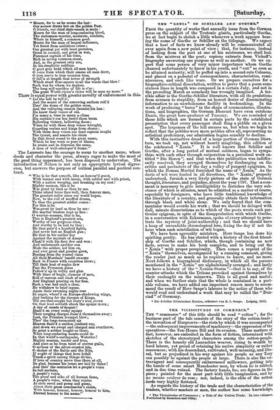Tint " XENIA. " OF SC HILLER AND G OETHE."
FROM the quantity of works that annually issue from the G-erman, press on the subject of the Teutonic giants, particularly Goethe, we at last begin to shrink a little whenever a work appears bear- ing the name of Goethe or Schiller on the titlepage. We expect that a host of facts we know already will be communicated all over again from a new point of view ; that, for instance, instead of looking from the poet at one of his mistresses, we shall look from the mistress at the poet; copious extracts from Viehoff's biography answering one purpose as well as another. Or we ex- pect that some person of very minor importance whom Goethe chanced unfortunately to know in his youth, and "cut" as soon as he attained maturity, will be puffed up into a second-rate Colossus, and placed on a pedestal of correspondence, characteristics, remi- niscences and such like ware. Or we prepare ourselves for a biographico-critical dissertation, written to prove that a poem some sixteen lines in length was composed in a certain Iuly, and not in the preceding March as somebody has wrongly imagined. A ter- rible affair is the Goethe-Schiller literature, with all its gradations from acumen to stupidity, from an honest desire of disseminating information to an unwholesome facility in bookmaking. In the work of producing " bores " in the shape of commentaries, illustra- tions, anti biographies, the German Diosouri have even outshone Dante, the great bore-producer of Tuscany. We are reminded of those hills which are formed in certain parts by the established prescription that every passenger shall fling a pebble on a given spot. The largeness of the hill amazes us, but when we begin to reflect that the pebbles were mere pebbles after all, representing no artistical proficiency, our admiration begins sensibly to decline.
With this instinctive dread of a large portion of German litera- ture, we took up, not without hearty misgiving, this edition of the celebrated "Xenia? It is well known that Schiller and Goethe, after a long period of mutual coldness, began to sympa- thize with each other through cooperation in. a periodical work en- titled "Die lloren "; and that when this publication was indiffer- ently received, they avenged themselves by discharging on the critics and poetasters of the day a volley of pungent epigrams, to which the Roman Martial furnished the name of "Xenia? As the darts of wit were hurled in all directions, the "Xenia," properly understood, furnish a very lively picture of the state of German thought,,literature, and prejudice, about the year 1797. That a com- ment is necessary to give intelligibility to distiches the very sub- stance of which is allusion, must be admitted as a matter of course, especially by foreigners, who have little traditional knowledge of the literature of a country, and generally obtain their information through black and white alone. We only feared that the com- mentator would overdo his work ; that we should be deluged with dull, minute dissertations as to which of the poets wrote each par- ticular epigram, in spite of the disapprobation with which Goethe, in a conversation with Eckermann, spoke of every attempt to pene- trate the mystery of joint-authorship ; and that we should have a heap of unreadable chronological lore, fixing the day if not the hour when each scintillation of wit began.
We have been agreeably mistaken. Herr Saupe has done his spiriting gently. Ile has started with a history of the first friend- ship of Goethe and Schiller, which, though containing no new facts, serves to make his book complete, and to bring out the " Xenia " with proper perspicuity.. Then comes a reprint of the "Xenia" themselves, accompanied by a running comment, giving the reader just as much as he requires to know' and no more. Next follows a biographical dictionary, in which all the persons mentioned in the "Xenia" are alphabetically arranged ; and lastly we have a history of the " Xenien-Sturm "—that is to say, of the counter-attacks which the Tritons provoked against themselves by their onslaught on the minnows. This is all good and useful; and when we further state that the whole is contained in a port- able volume, we have added one important reason more to recom- mend the result of Herr Saupe's labours to the notice of those who would read and understand a work that may be called the " Dan- ciad " of Germany.
*Die Schiller Gtitlidschen Xenien, erliutert von E. I. Saupe. Leipzig, 1651.


























 Previous page
Previous page